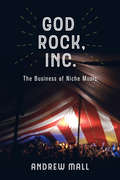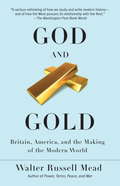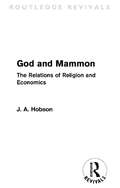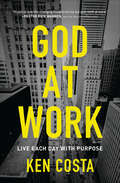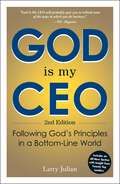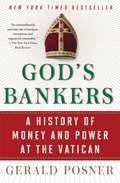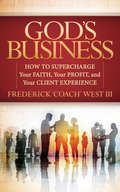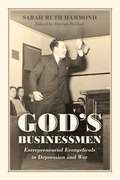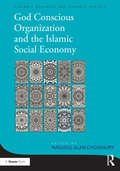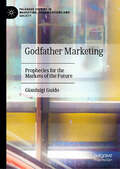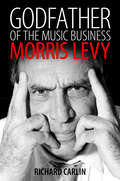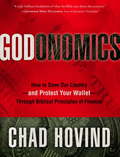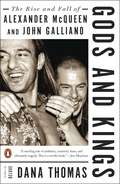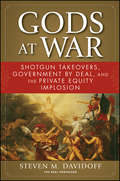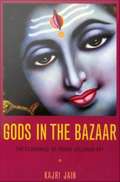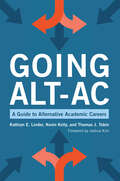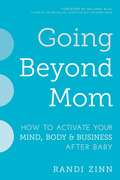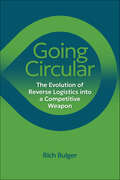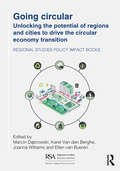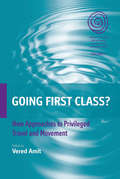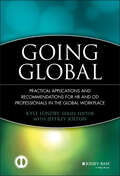- Table View
- List View
God Rock, Inc.: The Business of Niche Music
by Andrew MallPopular music in the twenty-first century is increasingly divided into niche markets. How do fans, musicians, and music industry executives define their markets’ boundaries? What happens when musicians cross those boundaries? What can Christian music teach us about commercial popular music? In God Rock, Inc., Andrew Mall considers the aesthetic, commercial, ethical, and social boundaries of Christian popular music, from the late 1960s, when it emerged, through the 2010s. Drawing on ethnographic research, historical archives, interviews with music industry executives, and critical analyses of recordings, concerts, and music festival performances, Mall explores the tensions that have shaped this evolving market and frames broader questions about commerce, ethics, resistance, and crossover in music that defines itself as outside the mainstream.
God and Gold
by Walter Russell MeadAn illuminating account of the birth and rise of the global political and economic system that, sustained first by Britain and now by America, created the modern world. Walter Russell Mead, one of our most distinguished foreign policy experts, makes clear that the key to the predominance of the two countries has been the individualistic ideology of the prevailing Anglo-American religion. Mead explains how this helped create a culture uniquely adapted to capitalism, a system under which both countries thrived. We see how, as a result, the two nations were able to create the liberal, democratic system whose economic and social influence continues to grow around the world. With wit, verve, and stunning insight, Mead recounts what is, in effect, the story of a centuries-long war between the English-speaking peoples and their enemies. Sustained by control of the oceans that surround them, the British and their American heirs built a global system of politics, power, investment, and trade over the past three hundred years. Along the way, the two nations developed a sophisticated grand strategy that brought the English-speaking powers to a pinnacle of global power and prestige unmatched in the history of the world. Since Oliver Cromwell's day, the English-speakers have seen their enemies as haters of liberty and God who care nothing for morality, who will do anything to win, and who rely on a treacherous fifth column to assure victory. Those enemies, from Catholic Spain and Louis XIV to the Nazis, communists, and Al-Qaeda, held similar beliefs about their British and American rivals, but we see that though the Anglo-Americans have lost small wars here and there, they have won the major conflicts. So far. The stakes today are higher than ever; technological progress makes new and terrible weapons easier for rogue states and terror groups to develop and deploy. Where some see an end to history and others a clash of civilizations, Mead sees the current conflicts in the Middle East as the latest challenge to the liberal, capitalist, and democratic world system that the Anglo-Americans are trying to build. What we need now, he says, is a diplomacy of civlizations based on a deeper understanding of the recurring conflicts between the liberal world system and its foes. In practice, this means that Americans generally, and especially the increasingly influential evangelical community, must develop a better sense of America's place in the world. Mead's emphasis on the English-speaking world as the chief hero (and sometimes villain) in modern history changes the way we see the world. Authoritative and lucid,God and Goldweaves history, literature, philosophy, and religion together into an eminently important work—a dazzling book that helps us understand the world we live in and our tumultuous times.
God and Mammon: The Relations of Religion and Economics (Routledge Revivals)
by J. A. HobsonFirst published in 1931, this is an attempt by the great economist J. A. Hobson to analyse the relations between economics and religion. After considering the origins of the conflicts and compromises between God and Mammon in the life of primitive man, the author concerns himself primarily with medieval and modern Christianity and the business climate and ethos corresponding with these periods. In particular he focuses upon Catholicism and Protestantism, before considering the attitude of the church towards modern economic movements.
God at Work: Live Each Day with Purpose
by Ken CostaGod calls us to the work we are doing. He&’s interested not only in what we do, but how we do it. Yet, finding purpose at work is one of the greatest challenges of our world today.Does my work matter to God? Is ambition good? How do I deal with failure? How do I make difficult decisions?Ken Costa shares his practical insights and experience gained from more than forty years working in finance. This timeless message, that there is space for faith at work, will truly inspire you to live each day with purpose.
God is My CEO: Following God's Principles in a Bottom-Line World
by Larry Julianhis new edition explores the ten most common issues facing business people today and applies God's principles to these dilemmas. You will learn that leading by faith isn't just about feeling good--it's about building employee morale, increasing productivity, and fostering customer loyalty. In addition, the brand-new section Timeless Wisdom from Twenty Leaders provides insight and encouragement from top members of the business world, including Marc Belton of General Mills, Richard Stearns of World Vision U.S., and Ken Blanchard, author of The One Minute Manager.God Is My CEO, 2nd Edition will inspire you to become a game-changer in the business world as you continue on your path as a leader.
God's Bankers: A History of Money and Power at the Vatican
by Gerald PosnerA deeply reported, New York Times bestselling exposé of the money and the clerics-turned-financiers at the heart of the Vatican—the world’s biggest, most powerful religious institution—from an acclaimed journalist with “exhaustive research techniques” (The New York Times).From a master chronicler of legal and financial misconduct, a magnificent investigation nine years in the making, God’s Bankers traces the political intrigue of the Catholic Church in “a meticulous work that cracks wide open the Vatican’s legendary, enabling secrecy” (Kirkus Reviews). Decidedly not about faith, belief in God, or religious doctrine, this book is about the church’s accumulation of wealth and its byzantine financial entanglements across the world. Told through 200 years of prelates, bishops, cardinals, and the Popes who oversee it all, Gerald Posner uncovers an eyebrow-raising account of money and power in one of the world’s most influential organizations. God’s Bankers has it all: a revelatory and astounding saga marked by poisoned business titans, murdered prosecutors, and mysterious deaths written off as suicides; a carnival of characters from Popes and cardinals, financiers and mobsters, kings and prime ministers; and a set of moral and political circumstances that clarify not only the church’s aims and ambitions, but reflect the larger tensions of more recent history. And Posner even looks to the future to surmise if Pope Francis can succeed where all his predecessors failed: to overcome the resistance to change in the Vatican’s Machiavellian inner court and to rein in the excesses of its seemingly uncontrollable financial quagmire. “As exciting as a mystery thriller” (Providence Journal), this book reveals with extraordinary precision how the Vatican has evolved from a foundation of faith to a corporation of extreme wealth and power.
God's Business: How to Supercharge Your Faith, Your Profit, and Your Client Experience (Morgan James Faith)
by Frederick "Coach" West IIIThe conflict between staying true to your faith and staying true to your company is a constant battle for Christian business owners. The serenity you feel on Sunday soon goes away Monday morning when dealing with customers, vendors, and employees. So here’s the question: Can you have God in your life every day so that you can feel that joy constantly? YES! In God’s Business: How to Supercharge Your Faith, Your Profit, and Your Client Experience, Frederick “Coach” West III lays the foundation to enjoy more of your faith in your business.
God's Businessmen: Entrepreneurial Evangelicals in Depression and War
by Darren Dochuk Sarah Ruth HammondThe evangelical embrace of conservatism is a familiar feature of the contemporary political landscape. What’s less well-known, however, is that the connection predates the Reagan revolution, going all the way back to the Depression and World War II. Evangelical businessmen at the time were quite active in opposing the New Deal—on both theological and economic grounds—and in doing so claimed a place alongside other conservatives in the public sphere. Like previous generations of devout laymen, they self-consciously merged their religious and business lives, financing and organizing evangelical causes with the kind of visionary pragmatism that they practiced in the boardroom. In God’s Businessmen, Sarah Ruth Hammond explores not only these men’s personal trajectories but also those of the service clubs and other institutions that, like them, believed that businessmen were God’s instrument for the Christianization of the world. Hammond presents a capacious portrait of the relationship between the evangelical business community and the New Deal—and in doing so makes important contributions to American religious history, business history, and the history of the American state.
God-Conscious Organization and the Islamic Social Economy (Islamic Business and Finance Series)
by Masudul Alam ChoudhuryCan there be God-conscious organizational behaviour in the real world of today’s capitalist corporations and the alternatives? In this overview of God-consciousness as a moral-awareness model of preference formation, functions, structures, and programs of organization within the purview of institutions and society, the authors explain and compare the major ethical issues of organizational behaviour and structure in Islamic economic theory and application. By analysing the nature of inclusive organizations and institutions, and the ethical preferences in Islamic choice framework, the authors from Saudi Arabia, Australia, Malaysia, Bangladesh, Canada, Indonesia and the UK, can highlight individual aspects to show whether capitalist organizational behaviour is sustainable. They describe how The Tawhidi epistemological framework governing conscious moral decision-making by institutions and organization, are used to establish the meaning and potential application of the concept of sustainability, and whether organizational moral objectives achieve their goals of life-fulfilment development, Poverty alleviation and the equitable distribution of wealth and resources.
Godfather Marketing: Prophecies for the Markets of the Future (Palgrave Studies in Marketing, Organizations and Society)
by Gianluigi GuidoIn a landscape marked by uncertainties stemming from global instability, societal fragmentation, and rapid technological advancements, consumers will be seeking immediate satisfaction for their vital needs and desires. To address this issue, firms will be called upon to grant favors even before selling products, offering solutions to consumers in exchange for their unwavering loyalty. This compelling book presents a unique and provocative new vision of future markets, where firms evolve into organizations reminiscent of “mafia families” stripped of criminal connotations, establishing relationships with their customers based on satisfaction, reciprocation, recognition of merit, and punishment of wrongdoing. In a “Credibility Economy”, where the quality of information supersedes its quantity, especially with the development of AI, this approach gives firms a competitive edge through the creation of a trusted network grounded in a code of honor. Godfather Marketing offers an engaging, accessible, and fresh perspective on marketing, where readers will discover unique insights on consumer behavior and market dynamics, highlighting how they can benefit the broader community, provided appropriate measures are taken to safeguard personal freedom.
Godfather of the Music Business: Morris Levy (American Made Music Series)
by Richard CarlinAssociation of Recorded Sound Collections Awards for ExcellenceBest Historical Research in Record Labels – Best History (2017)This biography tells the story of one of the most notorious figures in the history of popular music, Morris Levy (1927-1990). At age nineteen, he cofounded the nightclub Birdland in Hell's Kitchen, which became the home for a new musical style, bebop. Levy operated one of the first integrated clubs on Broadway and helped build the careers of Dizzy Gillespie and Bud Powell and most notably aided the reemergence of Count Basie. In 1957, he founded a record label, Roulette Records. Roulette featured many of the significant jazz artists who played Birdland but also scored top pop hits with acts like Buddy Knox, Frankie Lymon and the Teenagers, Joey Dee and the Starliters, and, in the mid-1960s, Tommy James.Stories abound of Levy threatening artists, songwriters, and producers, sometimes just for the sport, other times so he could continue to build his empire. Along the way, Levy attracted "investors" with ties to the Mafia, including Dominic Ciaffone (a.k.a. "Swats" Mulligan), Tommy Eboli, and the most notorious of them all, Vincent Gigante. Gigante allegedly owned large pieces of Levy's recording and retail businesses.Starting in the late 1950s, the FBI and IRS investigated Levy but could not make anything stick until the early 1980s, when Levy foolishly got involved in a deal to sell remaindered records to a small-time reseller, John LaMonte. With partners in the mob, Levy tried to force LaMonte to pay for four million remaindered records. When the FBI secretly wiretapped LaMonte in an unrelated investigation and agents learned about the deal, investigators successfully prosecuted Levy in the extortion scheme. Convicted in 1988, Levy did not live to serve prison time. Stricken with cancer, he died just as his last appeals were exhausted. However, even if he had lived, Levy's brand of storied high life was effectively bust. Corporate ownership of record labels doomed most independents in the business, ending the days when a savvy if ruthless hustler could blaze a path to the top.
Godiva Japan: Think Local, Scale Global
by Esel Cekin Rohit Deshpande Akiko KannoThis case tracks Jerome Chouchan's strategies and execution for a successful turn around of Godiva Japan's operations which was experiencing a decline in sales when he became the managing director of the company in 2010. Through various initiatives and innovations, Godiva Japan had targeted a variety of demographic segments in different sales points, acquired new customers and created a moment of luxurious consumption for all ages. Accordingly, within Godiva's global enterprise, Godiva Japan had become number two in terms of worldwide sales and number one in terms of profits. It exported made-in Japan products and concepts to Godiva's other markets. How could Chouchan keep the momentum and sustain Godiva Japan's top-line and bottom-line growth going forward? Would he be able to keep the balance between aspirational and accessible? How much of the success in Japan might contribute to the growth of Godiva's global sales?
Godiva Japan: Think Local, Scale Global
by Esel Cekin Rohit Deshpande Akiko KannoThis case tracks Jerome Chouchan's strategies and execution for a successful turn around of Godiva Japan's operations which was experiencing a decline in sales when he became the managing director of the company in 2010. Through various initiatives and innovations, Godiva Japan had targeted a variety of demographic segments in different sales points, acquired new customers and created a moment of luxurious consumption for all ages. Accordingly, within Godiva's global enterprise, Godiva Japan had become number two in terms of worldwide sales and number one in terms of profits. It exported made-in Japan products and concepts to Godiva's other markets. How could Chouchan keep the momentum and sustain Godiva Japan's top-line and bottom-line growth going forward? Would he be able to keep the balance between aspirational and accessible? How much of the success in Japan might contribute to the growth of Godiva's global sales?
Godonomics: How to Save Our Country--and Protect Your Wallet--Through Biblical Principles of Finance
by Chad HovindGod's solution to America's economic crisis Saving America's economy is not a conservative-versus-liberal issue, it is a biblical issue. National leaders have failed to pull the country out of its financial tailspin because both major parties are working from the wrong text. For a nation to achieve stability and enjoy lasting economic health, it needs to adopt the economic principles set forth in the Bible. Godonomics uncovers the core teachings from God's Word that offer the only workable solution to our nation's economic back-slide. Biblical principles uphold the superiority of free-market capitalism, which produced history's highest standard of living and established the United States as an unrivaled superpower. But forces are at work today, even in the church, that seek to enslave our nation in a socialistic system. Now you can speak out--using God's Word--against false teachings that endanger your livelihood and the future of America. Let Godonomics show you God's requirements for financial success--in your own life and in the affairs of our nation. By following Scripture's economic principles, you can ensure your family's financial wellbeing even if America falls into a deepening crisis. And if we act together, it is not too late to reverse the decline. "Godonomics is a thoughtful critique of the theories that control the world of commerce and shape the lives of men and nations. Chad Hovind challenges us to reassess doing business as usual."--Dr. Peter A. Lillback, president of Westminster Theological Seminary, Philadelphia "Chad Hovind offers a creative and compelling case for the constitutional framework for government. He also provides practical fi nancial principles that will help you make wise decisions with your money."--Shane F. Krauser, author of Your Nation to Save, director of the American Academy for Constitutional Education "Godonomics is an incredible comparison of biblical economics and the culture. A real eye-opener." --Josh D. McDowell, popular speaker, coauthor of Undaunted and The Unshakable Truth "Chad Hovind brings a reasonable voice to the convinced and the unconvinced. Godonomics applies God's wisdom on economics both to individuals and nations. You will learn about the Bible's prescription to secure our nation's future economic health."--David Barton, founder and president of WallBuilders "Using God's Word regarding financial principles, you can now be bold in speaking out against false teachings. Your entire family will learn from this important book."--Mark Whitacre, PhD, president of operations and COO of Cypress Systems Inc.
Godrej Agrovet Ltd (GAVL)
by Anjali Raina Jose B. Alvarez Rachna ChawlaNadir Godrej Chairman and B Yadav MD, Godrej Agrovet Ltd ( GAVL) grapple with the challenge of growing their cattle feed business - should they integrate vertically despite the challenges ofthe dairy industry, and risk the profitability of the current business ? The ban on cow slaughter in India adds to the dilemma.
Gods and Kings: The Rise and Fall of Alexander McQueen and John Galliano
by Dana ThomasMore than two decades ago, John Galliano and Alexander McQueen arrived on the fashions scene when the business was in an artistic and economic rut. Both wanted to revolutionize fashion in a way no one had in decades. They shook the establishment out of its bourgeois, minimalist stupor with daring, sexy designs. They turned out landmark collections in mesmerizing, theatrical shows that retailers and critics still gush about and designers continue to reference.<P><P> Their approach to fashion was wildly different—Galliano began as an illustrator, McQueen as a Savile Row tailor. Galliano led the way with his sensual bias-cut gowns and his voluptuous hourglass tailoring, which he presented in romantic storybook-like settings. McQueen, though nearly ten years younger than Galliano, was a brilliant technician and a visionary artist who brought a new reality to fashion, as well as an otherworldly beauty. For his first official collection at the tender age of twenty-three, McQueen did what few in fashion ever achieve: he invented a new silhouette, the Bumster.<P> They had similar backgrounds: sensitive, shy gay men raised in tough London neighborhoods, their love of fashion nurtured by their doting mothers. Both struggled to get their businesses off the ground, despite early critical success. But by 1997, each had landed a job as creative director for couture houses owned by French tycoon Bernard Arnault, chairman of LVMH.<P> Galliano’s and McQueen’s work for Dior and Givenchy and beyond not only influenced fashion; their distinct styles were also reflected across the media landscape. With their help, luxury fashion evolved from a clutch of small, family-owned businesses into a $280 billion-a-year global corporate industry. Executives pushed the designers to meet increasingly rapid deadlines. For both Galliano and McQueen, the pace was unsustainable. In 2010, McQueen took his own life three weeks before his womens' wear show.<P> The same week that Galliano was fired, Forbes named Arnault the fourth richest man in the world. Two months later, Kate Middleton wore a McQueen wedding gown, instantly making the house the world’s most famous fashion brand, and the Metropolitan Museum of Art opened a wildly successful McQueen retrospective, cosponsored by the corporate owners of the McQueen brand. The corporations had won and the artists had lost.<P> In her groundbreaking work Gods and Kings, acclaimed journalist Dana Thomas tells the true story of McQueen and Galliano. In so doing, she reveals the revolution in high fashion in the last two decades—and the price it demanded of the very ones who saved it.
Gods at War
by Steven M. DavidoffAn engaging exploration of modern-day deals and deal-makingGods at War details the recent deals and events that have forever changed the world of billion-dollar deal-making. This book is a whirlwind tour of the players determining the destiny of corporate America, including the government, private equity, strategic buyers, hedge funds, and sovereign wealth funds.It not only examines many of the game-changing takeover events that have occurred in the past years, but also puts them into context and exposes what is really going on behind the scenes on Wall Street. Gods at War completely covers the strategic issues that guide the modern-day deal, and since they unfold under the shadow of the law, it also focuses on the legal aspects of deal-making and takeovers.Each chapter unfolds through the lens of a recent transaction, from the battle between Yahoo! and Microsoft to the United Rental/Cerberus disputeProvides in-depth explanations and analysis of the events and actors that have shaped this fast-moving fieldExamines the federal government's regulation by deal approach to saving the financial system and explains the government's biggest "deals", including its bail-outs of AIG, Bank of America, and CitigroupFilled with in-depth insights that will enhance your understanding of this field, Gods at War offers an engaging look at deals and deal-makers in the context of recent historical events. It's a book for those who want to understand deals, takeovers, and the people and institutions who shape our world.
Gods in the Bazaar: The Economies of Indian Calendar Art
by Kajri JainGods in the Bazaar is a fascinating account of the printed images known in India as "calendar art" or "bazaar art," the color-saturated, mass-produced pictures often used on calendars and in advertisements, featuring deities and other religious themes as well as nationalist leaders, alluring women, movie stars, chubby babies, and landscapes. Calendar art appears in all manner of contexts in India: in chic elite living rooms, middle-class kitchens, urban slums, village huts; hung on walls, stuck on scooters and computers, propped up on machines, affixed to dashboards, tucked into wallets and lockets. In this beautifully illustrated book, Kajri Jain examines the power that calendar art wields in Indian mass culture, arguing that its meanings derive as much from the production and circulation of the images as from their visual features. Jain draws on interviews with artists, printers, publishers, and consumers as well as analyses of the prints themselves to trace the economies--of art, commerce, religion, and desire--within which calendar images and ideas about them are formulated. For Jain, an analysis of the bazaar, or vernacular commercial arena, is crucial to understanding not only the calendar art that circulates within the bazaar but also India's postcolonial modernity and the ways that its mass culture has developed in close connection with a religiously inflected nationalism. The bazaar is characterized by the coexistence of seemingly incompatible elements: bourgeois-liberal and neoliberal modernism on the one hand, and vernacular discourses and practices on the other. Jain argues that from the colonial era to the present, capitalist expansion has depended on the maintenance of these multiple coexisting realms: the sacred, the commercial, and the artistic; the official and the vernacular.
Gogoro: From Electric Scooter to Energy Platform
by Tarun Khanna Billy ChanThe founder of Gogoro had always wanted to revolutionize the energy market from day one since he started the electric scooter business that featured an innovative battery swapping technology. Over the course of five years, he had developed a premium line of electric scooters, gained market share to about 90 percent, and turned his startup into a "unicorn" with a valuation reaching $1 billion. With its battery swapping infrastructure built out across the island of Taiwan, Gogoro sensed the opportunity to become something bigger - most probably a smart energy platform that could complement the main grid. But as a sudden change in government subsidies and the outbreak of the coronavirus pandemic took a toll on the scooter sales, how should Gogoro position itself going forward?
Going Alt-Ac: A Guide to Alternative Academic Careers
by Kevin Kelly Thomas J. Tobin Kathryn E. LinderA growing number of people completing or holding graduate degrees now seek non-faculty positions—also called alternative academic, or “alt-ac” positions—at different stages in their careers. While an increasing number of people with doctoral degrees are hunting for a diminishing pool of tenure-track faculty jobs, most degree-granting institutions do not adequately prepare their graduate students to enter the new reality of the alt-ac job market. Yet the administrative ranks in higher education institutions are growing, as colleges and universities are creating a diverse range of positions that support teaching and learning efforts.Focusing on the range of potential alternative career choices, this highly practical book offers tools and prompts for readers who are:·Considering whether to choose an alt-ac career path·Seeking specific alt-ac positions·Advising graduate students or mentoring recent professional graduates·Encountering alt-ac career challengesThe authors offer case stories—their own and those of colleagues across North America in alt-ac roles—with concrete examples designed to help readers pursue, obtain, and excel in a wide variety of alt-ac positions. The book can equally be used as a resource for graduate courses on professional development and job-market preparation.
Going Beyond Mom: How to Activate Your Mind, Body & Business After Baby
by Randi ZinnBorn out of her popular website Beyond Mom, Randi’s book is a guide for mothers looking to jump-start their business ideas by finding connection from within. The 1.2 million women in America each year who choose not to return to traditional work after having children have found themselves filled with an unexpected creative energy, but lack the knowledge and network to tap it.With the support of the Beyond Mom community behind you, Randi provides the guidance and the tools women need to find their strength, body, and mind, thus laying the integral foundation to bring entrepreneurial ideas to fruition. Her distinct approach is as practically accessible as it is holistic—a former yoga teacher who also possesses a decade of experience as an acting CEO, she knows that personal well-being is critically connected to any thriving business venture. Because the first step to personal wellness and idea growth begins with you. In addition, each chapter features an interview from the Beyond Mom network of celebrity moms, successful businesswomen, and clients, like bestselling author and coach Alexandra Jamieson, renowned psychotherapist Terri Cole, IntenSati founder Patricia Moreno, and author/anthropologist Wednesday Martin, just to name a few. Honest, smart, and relatable, Randi provides wisdom and encouragement to build entrepreneurs (who are also moms) from deep within!
Going Circular: The Evolution of Reverse Logistics into a Competitive Weapon
by Rich BulgerThe essential business guide for using reverse logistics to drive profits, growth, and sustainability. Long considered a &“necessary evil&” of doing business, reverse logistics is quickly becoming the key to staying competitive in today&’s dynamic marketplace. In Going Circular, RecirQ Global CEO Rich Bulger reveals its potential for boosting revenue, enhancing customer experience, and supporting the circular economy. Urging a strategic shift, Going Circular showcases how integrating reverse logistics in sales, marketing, and customer retention can achieve broader business objectives, including cost reduction and environmental responsibility. It offers practical strategies for minimizing unwanted returns and repurposing products, fostering sustainable business models and market expansion. Comprising seven comprehensive chapters and three &“reUse&” case studies, this guide redefines reverse logistics as a vital tool for business resilience and success. A must-read for professionals in the field, Going Circular is a call to action for integrating reverse logistics into evolving business strategies, promising a pathway to sustainable transformation and profitability.
Going Circular: Unlocking the potential of regions and cities to drive the circular economy transition (Regional Studies Policy Impact Books)
by Joanna Williams Marcin Dąbrowski Karel Van den Berghe Ellen Van BuerenGoing Circular explores the concept of a circular economy (CE) and its transformative potential for cities and regions. It emphasises the importance of spatial planning and the role of urban and regional authorities in driving the transition to a more sustainable, resilient and inclusive economic and societal model. The authors offer a critical perspective, arguing that there is no onesize-fits-all approach to regional and urban CE policies. Instead, they advocate for a context-specific understanding of CE, emphasising the importance of: local and regional conditions for circular activities; the spatial patterns in resource stocks and flows within territories, and the need to engage a range of stakeholders and communities in decision-making processes.Going Circular tackles the pivotal policy issues and challenges related to CE transitions in cities and regions. It will inform and equip public and private policymakers, urban planners and regional authorities with the knowledge and tools needed to foster a CE and nudge cities and regions towards sustainable futures.Despite extensive data and knowledge available on cities and regions, terms such as ‘circularity’, ‘economy’ and ‘space’ often remain disjointed for researchers, policymakers and practitioners alike. This book presents a frank and insightful exploration of the spatial dimension of the circular economy, challenging assumptions and idealisms. It provides practical opportunities for action by underscoring the importance of geopolitics, empathy and justice, ecosystems restoration, and assessment of progress on the transition pathways towards a circular economy. The book equips readers with language and visual concepts needed to engage with and communicate this topic confidently. I highly recommend it as both an introduction and a refresher on the topic of circular regions and cities.Adrian Vickery Hill, Strategist and designer - director, Osmos NetworkThis book outlines a path to trigger circular economy processes that can transform cities and regions, guiding them towards a more resilient and sustainable future, while producing context-appropriate solutions. Circular economy is a context-specific, place-based process that requires a holistic and systemic perspective, in which space plays a crucial role. In six thematic chapters, the book proposes a pathway analysing several key issues: the spatial dimension of circular economy; the opportunities for more ecologically healthy, resource-sufficient metropolitan regions; the integration of social justice and the concept of “care-full” circular economy; the ecological implications of the transition in line with the urban circular bioeconomy; the multidimensional assessment of the transition progress and cross-level interdependencies; as well as policy recommendations for multi-level governance at various scales. This book provides an inspiring perspective on circular economy, not only as a technical and economic challenge, but also as a social and political opportunity. It is highly recommended for anyone interested in fostering a more sustainable and circular future for our cities.Prof. Maria Cerreta, University of Naples “Federico II”
Going First Class?
by Vered AmitPeople travel as never before. However, anthropological research has tended to focus primarily on either labor migration or on tourism. In contrast, this collection of essays explores a diversity of circumstances and impetuses towards contemporary mobility. It ranges from expatriates to peripatetic professionals to middle class migrants in search of extended educational and career opportunities to people seeking self development through travel, either by moving after retirement or visiting educational retreats. These situations, however, converge in the significant resources, variously of finances, time, credentials or skills, which these voyagers are able to call on in embarking on their respective journeys. Accordingly, this volume seeks to tease out the scope and implications of the relatively privileged circumstances under which these voyages are being undertaken.
Going Global
by Allen I. Kraut Kyle Lundby Jeffrey JoltonThis book uses the employee lifecycle as an underlying organizing framework and examines critical phases in I/O practice and the employee lifecycle (e.g., selection/placement, performance management/development, ongoing organizational performance). It also shows how they are manifested in a global and culture-spanning space. The book showcases various sets of I/O practices that are firmly grounded in good science. Throughout the book, practical advice is offered by those who have engaged clients globally in each of these phases. This resource is written for global I/O faculty and practitioners, students, and HR professionals.
